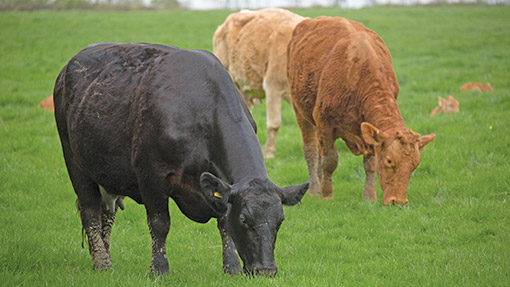Opinion: Transparency over beef origin is vital

This week saw Ofgem publicly criticising energy companies for not passing on lower wholesale prices to the consumer. Sound familiar? Isn’t this exactly the practice that beef farmers in this country have been accusing the major retailers of, asks the NFU’s Minette Batters.
We all accept that in the short term we have suddenly got a lot more beef on the home market and this will drop prices at the farmgate. But to have supermarkets citing that one of the problems is falling demand when in fact they have put up the price to the consumer is incredibly frustrating.
See also: Britain’s beef imports explained
If you go on the Eblex website there is a section that tracks the farmgate price against the retail price. Since last November, the two figures have been, month by month, moving in opposite directions.
 Minette Batters
Minette BattersDeputy president
NFU
Supply and demand
The laws of supply and demand are inevitable but when one part of the supply chain says “thank you very much, we will have that bit of profit” and does not play its part in helping shift the surplus, it can only expect an angry reaction.
The extra supplies of beef on the market are undoubtedly due to the increased slaughter numbers coming out of Ireland.
Those facts are irrefutable, although you might expect that with so much cheaper Irish beef around, imports from other countries might have tailed off a bit. The UK imported nearly 77,000t of beef in the first four months of this year, and just over 55,000t was from Ireland. So that still means about 21,000t has come in from a wide range of other countries.
Through my catering business I have trawled the aisles of wholesalers and supermarkets for years. Last weekend one well-known wholesaler’s meat counter was brimming with Australian beef — the only British beef was diced beef mixed in the same pack as Irish.
During horsegate last year, British consumers demonstrated what they wanted to buy by demanding British beef. Today we see in many of the mainstream supermarkets a deliberate fudge exploiting that will of the public to buy British. They use the words “British Isles”; they talk about British and Irish and stick the Union Jack on the label and mix British and Irish beef together so that it is confusing for the consumer.
The supermarkets say the public is quite happy to buy Irish and don’t have an issue. So my challenge to all supermarkets is prove it. Separate the British and Irish and make it clear to the consumer so that they can choose. Of course much of the time the supermarkets have no idea what the balance of Irish versus British is because they are dependent on a barcode system.
While the pack is labelled British or Irish (the law insists), the barcode is the same so there is hardly any way to check what they are being supplied. This is particularly relevant when it comes to Irish-owned processors, supplying the supermarkets, that have a foot in both camps.
Given the promiscuous behaviour that is going on, we should be urgently looking for a way that barcoding can show the country of origin.
Under threat
Traditional suckler beef production is under threat of extinction both here and in Ireland at the moment. For many farmers it is the only thing their land and buildings allow them to do.
Traditional suckler production plays a vital role in delivering the wonderful landscape we have in this country, but those are not the main reasons why it is important we find a way to hang on to suckler production.
The main reason is that traditional suckler beef production has given British beef the reputation of being the best in the world. Consumers across the globe look for and want to buy British beef; it spearheads our push to increase exports, maybe not in volume, but in reputation and image.
At the recent South of England Show, Defra secretary Owen Paterson said in his speech that the Red Tractor scheme offered the best traceability of any country in the world. If an animal loses an ear tag, farmers are penalised via cross-compliance. We need similar penalties for processors and retailers who are not adopting fair trade principles.
The message from British beef farmers is simple: we want to keep producing the best beef in the world, so please stop this short-sighted profiteering now.
